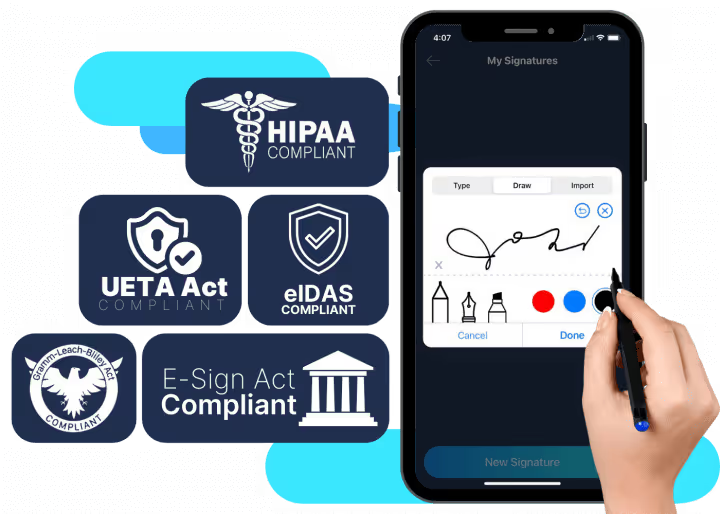
Secure and compliant electronic signature for accountants
Eliminate manual processes in your workflow. Assure clients that all documents are legally binding after eSigning. Our comprehensive solution provides accountants with an efficient system that supports seamless integration within any workflow or application.
Goodbye, boring paperwork.
Hello, eSigning accounting documents.
.avif)
Create forms and eSign documents
Transform your workflows and make tedious tasks a thing of the past – create forms, send and request signatures, and simplify document management easily. Integrate digital documents into everyday operations for maximum efficiency – starting today.
.avif)
Track signature requests
Take control of your signature requests. With our real-time tracking system, stay up to date and never miss a document. Get complete visibility into all your documents’ progress with a few clicks. Receive email notification when the signee views and signs the document.

Fully protected with industry-standard encryption
Enjoy maximum security with the robust 256-bit military-grade encryption we provide. Ensure your data and information is always kept safe. Trust that you’re in good hands. Keep your data secure and away from vulnerabilities.
Notable features to revolutionize the accounting process

Unlimited signature requests

Legally binding templates

Sign in to any device

Verify signees

Detailed audit trail

Form analytics
What our users say about us

Fill For Every Industry
Know more about Fill esignature on accounting
Does the IRS allow the use of electronic signatures for tax forms?
The IRS allows taxpayers to use electronic signatures on certain tax documents, which taxpayers can’t file using IRS e-file. An eSignature meets IRS acceptance requirements as long as they meet specific criteria, regardless of the technology that the filer used to eSign it. These includes:
- Your typed name on a signature block
- A scanned image of your handwritten signature is attached to the document
- Your handwritten signature signed using an eSignature pad
- A handwritten signature, mark, or command on a display screen signed using a stylus device
- A signature that you create using a third-party eSigning platform or software
The forms include 11-C, 637, 706, 730, and more. For a complete list of tax forms and documents, visit the IRS official website.
Can electronic signatures be used for tax forms, invoices, and other accounting documents?
Yes. It’s because digital signatures are accepted in most countries worldwide for most business documents. Moreover, their usage is secure and highly reliable – eSigning processes are automated with powerful signature verifications and encryption tools, keeping all records safe from tampering or cyber fraud.
Furthermore, these signatures meet many professional organizations’ internal auditing process requirements, including universities and financial institutions.
With effective eSigning systems like Fill, you can quickly generate documents using legal templates related to taxes and accounting while simplifying the entire process of gathering your team’s signatures quickly and accurately.
How do eSignatures simplify accounting processes?
eSignatures provide an ideal solution to bring the benefits of automation and efficiency to the accounting process. By enabling digital signatures, users no longer waste time chasing down paper documents and manually validating paper-based approvals.
This can quickly streamline workflows and accelerate business processes that are traditionally labor-intensive and costly, like onboarding, invoice processing, and audit compliance. Moreover, eSigning technology assures users that their signature is legally binding, thus reducing the risk of fraud.
With today’s digital solutions, organizations can gain greater control over accounting operations while improving accuracy and saving tremendous amounts of resources in the long run.
How secure are electronic signatures for accounting?
Data security depends on how the eSignature service provider handles the process. Most premium eSigning solutions providers use advanced encryption technology like 256-bit encryption and SSL.
256-bit encryption is one of the most commonly used forms of computer security. Primarily used to protect online data and communications, this type of encryption involves transforming plain text into complex strings of numbers and letters using a key that is more than 256 characters long.
SSL, or Secure Sockets Layer, is a protocol to encrypt data between devices while transmitting electronically. It is most commonly known for providing secure connections to websites that users can identify by the https:// beginning of the URL.
When protecting electronic signatures, SSL continues this same encryption during transmissions, ensuring that the signature and other data being transmitted electronically are protected against unauthorized access.
Biometric signer verification is an essential measure for safeguarding the eSigning process. It collects a wide array of data points from each signer, which is then stored and compared to the data set collected for that signer during future eSigning transactions.
It makes it possible to detect unauthorized access and accurately verify the genuine identity of each signer. By using advanced technologies such as facial recognition and knowledge-based authentication, biometric verification eliminates the need for manual document validation, providing a secure experience for all parties involved in a digital transaction.
What are the benefits of using digital signatures in accounting?
Digital signatures are a powerful tool for accountants to ensure accuracy and security in their records. Utilizing digital signatures in accounting can provide five key benefits:
- Increased Efficiency – digital signatures offer faster signing of documents, quicker access to information, and a more streamlined workflow for accounting processes. It helps accountants save time on paperwork and streamline their operations.
- Enhanced Security – digital signature authentication protocols help ensure that documents have not been tampered with during transmission or storage and that the intended recipient signed them. Furthermore, digital signatures are stored securely within the accounting system, preventing unauthorized tampering or data loss.
- Increased Accuracy – Digital signatures offer an audit trail through which accountants can review all of their transactions quickly and accurately. It decreases the risk of inaccurate records being entered into the system or lost or misplaced documents.
- Improved Compliance – With digital signatures, accountants can be sure that all regulatory requirements are met since they create an immutable record of transactions that cannot be modified without detection.
- Cost Savings – By reducing the time spent on paperwork and manual processes, digital signatures also help reduce operational costs associated with accounting practices and improve customer satisfaction due to shorter processing times for orders or payments made online via digital signature authentication protocols.
Can I track the status of my accounting documents with Fill?
The Fill document-signing app is free to download, but access to its full features is limited unless you upgrade to a paid monthly or yearly subscription. If you want to experience having full access to the PRO plan, avail of our time-limited free trial, which you can cancel at any time.
To start using Fill and see it in action, go to our web app and sign up for an account. It lets you upload and send unlimited signature requests. Fill offers the most affordable monthly and yearly plans, starting at $8.33 per month.
What is the best document-signing app?
Yes, you can track the status of your accounting documents with Fill. Your dashboard will provide an overview of where each document is in the signing process.
You will also receive an email notification when the signee views the document so that you can keep track of how it is progressing. As soon as the document is signed, you will get a notification to let you know that it has been completed.
This provides a convenient way to stay up-to-date and ensure that your documents are eSigned quickly and efficiently. Additionally, keeping track of your accounting documents with Fill helps ensure accuracy and compliance, as all documents are securely stored for future reference.
What is the best electronic signature for accounting firms?
Fill is an excellent choice when it comes to finding the best electronic signature for accounting firms. With its intuitive interface and security-forward features, Fill offers the perfect balance between ease of use and protection from fraud.
The advanced encryption technology ensures that all eSignatures are authentic and legally binding. All documents are signed with digital signatures that can’t be forged, allowing you to keep your client’s data safe. In addition, all documents are stored securely and monitored for any changes to provide an extra layer of protection against fraud or tampering.
Moreover, the eSignature platform is incredibly user-friendly. The signing process is fast and easy, with a simple drag-and-drop feature that makes it easier to create eSignature documents quickly and accurately.
Finally, Fill provides comprehensive customer support with dedicated experts ready to help whenever needed. Whether you have questions about eSigning or need help troubleshooting an issue, their team is always available 24/7.

.avif)




